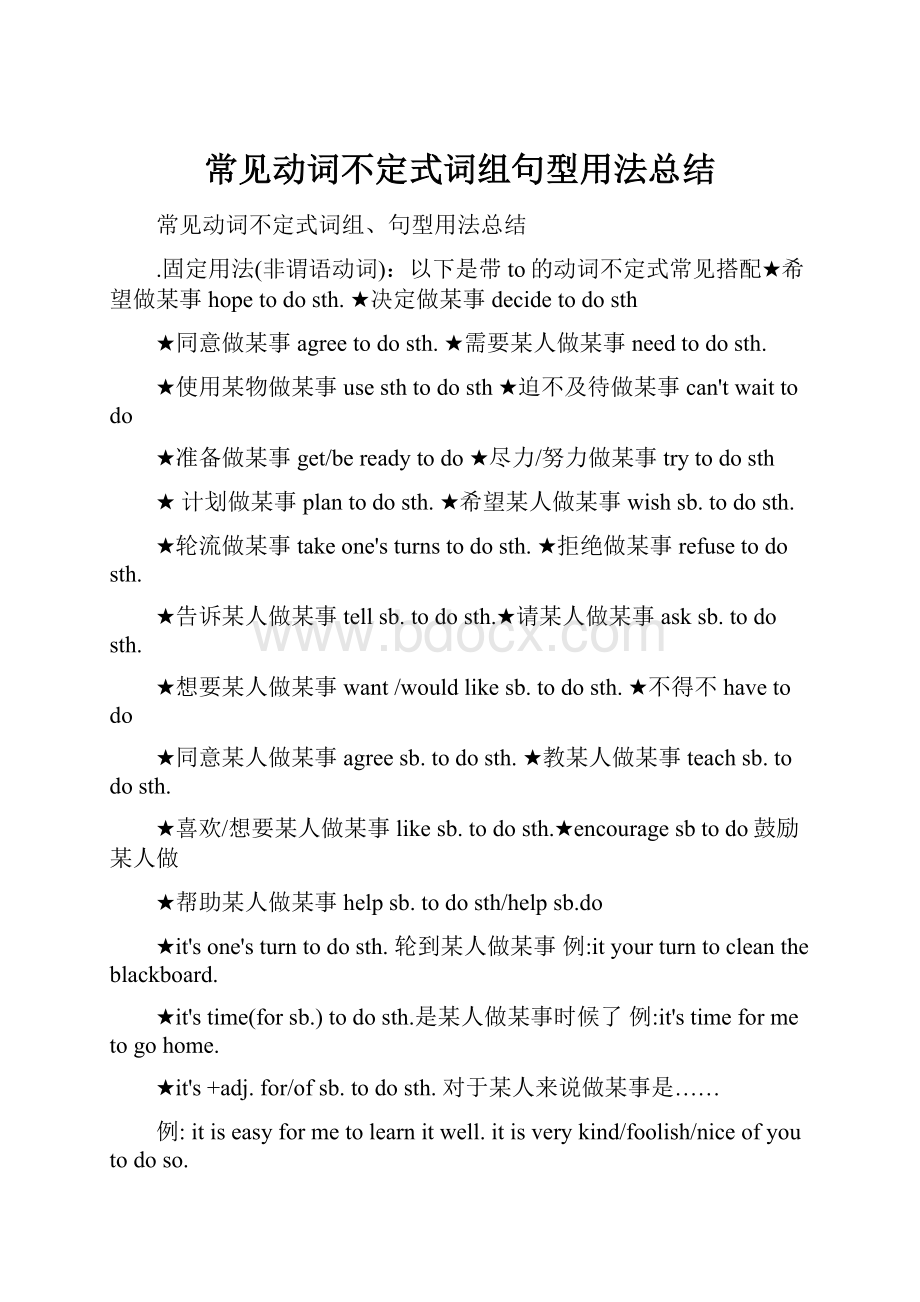常见动词不定式词组句型用法总结.docx
《常见动词不定式词组句型用法总结.docx》由会员分享,可在线阅读,更多相关《常见动词不定式词组句型用法总结.docx(23页珍藏版)》请在冰豆网上搜索。

常见动词不定式词组句型用法总结
常见动词不定式词组、句型用法总结
.固定用法(非谓语动词):
以下是带to的动词不定式常见搭配★希望做某事hopetodosth.★决定做某事decidetodosth
★同意做某事agreetodosth.★需要某人做某事needtodosth.
★使用某物做某事usesthtodosth★迫不及待做某事can'twaittodo
★准备做某事get/bereadytodo★尽力/努力做某事trytodosth
★计划做某事plantodosth.★希望某人做某事wishsb.todosth.
★轮流做某事takeone'sturnstodosth.★拒绝做某事refusetodosth.
★告诉某人做某事tellsb.todosth.★请某人做某事asksb.todosth.
★想要某人做某事want/wouldlikesb.todosth.★不得不havetodo
★同意某人做某事agreesb.todosth.★教某人做某事teachsb.todosth.
★喜欢/想要某人做某事likesb.todosth.★encouragesbtodo鼓励某人做
★帮助某人做某事helpsb.todosth/helpsb.do
★it'sone'sturntodosth.轮到某人做某事例:
ityourturntocleantheblackboard.
★it'stime(forsb.)todosth.是某人做某事时候了例:
it'stimeformetogohome.
★it's+adj.for/ofsb.todosth.对于某人来说做某事是……
例:
itiseasyformetolearnitwell.itisverykind/foolish/niceofyoutodoso.
★ittakessb.sometimetodosth.某人做某事花了某时间
例句:
1.ittakesmeanhourtogettoschoolbybike.2.ittookmeanhourtowatchtvlastnight.3.itwilltakehertwoweekstofinishthework.
★too+adj./adv.todosth.太…..而不能例:
hewastoangrytosayaword.
★find/think/feelit+adj.todosth.发现/认为/感到做某事是…ifind/think/feelithardtolearnenglishwell.
★序数词+todo第…..个做某事例句:
whoisthefirsttogetthere?
★我不知/忘记了怎么办。
ididn'tknow/forgotwhattodo.
★离开房间时不要忘记/记住关灯
例句:
don'tforget/remembertoturnoffthelightswhenyoulefttheroom
★be+adj+todosth例句:
iamverysorrytohearthat.iamreadytohelpothers.iamhappy/pleased/gladtomeetyou.
顺口溜:
本领最多不定式,主表定补宾和状;样样成分都能干,只有谓语它不敢;大家千万要小心,有时它把句型改;作主语时用it,自己在后把身藏;七个感官三使役,宾补要把to甩开;疑问词后接上它,宾语从句可充当;逻辑主语不定式,不定式前加forsb.;to前not是否定,各种用法区别开。
以下是不带to的动词不定式(即动词原形)的常见用法
★letsb.dosth让某人做某事★makedosth使得某人做某事
★heardosthdosth听见某人做某事★seedosthdosth看见某人做某事
★whynot/whydon'tyou+动原?
为什么不.?
whynot/whydon'tyoutakeawalk?
★某人+hadbetter(not)do某人最好(不)做某事
★情态动词can/may/must/should+动词原(包括情态动词的否定形式+动词原形)
★助动词do/does/did/will/would在构成疑问句或者构成否定句即don't/doesn't/didn't/willnot/wouldnot+动词原形
★begoingto+动词原形(表示“即将”“打算”做某事)
使用-ing分词的几种情况
1.在进行时态中。
heiswatchingtv.theyweredancingatnineo'clocklastnight.
2.在therebe结构中。
如:
thereisaboyswimmingintheriver.
3.在havefun/problems结构中。
如:
wehavefunlearningenglishthisterm.
theyhadproblemsgettingtothetopofthemountain.
4.在介词后面。
如:
thanksforhelpingme.areyougoodatplayingbasketball?
what/howaboutdoingsth?
做某事怎么样?
iaminterestedinplayingfootball.
5.在以下结构中1.enjoydoingsth喜欢做某事;
2.finishdoingsth;完成做某事;3.feellikedoingsth想要做某事;
4.stopdoingsth停止做某事(原来的事)5.forgetdoingsth忘记做过某事
6.goondoingsth继续做某事(原来的事);7.rememberdoingsth记得做过某事
8.likedoingsth喜欢做某事;9.find/see/hear/watchsbdoing发现/看到/听到/观看某人做
10.trydoingsth试图做某事;11.needdoingsth需要做某事;
12.preferdoingsth宁愿做某事;13.minddoingsth介意做某事;
14.missdoingsth错过做某事;15.practicedoingsth练习做某事;
16.bebusydoingsth忙于做某事;17.can'thelpdoingsth禁不住做某事;
18.wastetime/moneydoing浪费时间/钱做;19.keepsb.doing让…始终/一直做…
20.stopsb.(from)doing阻止某人做某事
21.preferdoingatodoingb=likeabetterthanb喜欢做b更喜欢做a
22.“dosome+doing”短语如:
dosomeshopping/dosomewashing/dosomereading/dosomepracticing/dosomecleaning/dosomespeaking
23.“godoing”短语去做某事(主要指文娱活动等)如:
goshopping/gofishing/goswimming/gohiking/goskating/gocamping/goskiing(滑雪/goboating/gohunting(打猎)
.注意动词的过去分词的常见搭配:
ifeel(am/was)excited/surprised/amazed/interested/tired/pleased/worried/lost
keep…closed/aboycalled/namedtom
动词不定式的语法功能
一、作宾语
1)动词+不定式
afford.aim.appear.agree.arrange.ask.be.decide.bother.care.choose.come.dare.demand.desire.determine.expect.elect.endeavor.hope.fail.happen.help.hesitate.learn.long.mean.manage.offer.ought.plan.prepare.pretend.promise.refuse.seem.tend.wait.wish.undertake.
举例:
thedriverfailedtoseetheothercarintime.
司机没能及时看见另一辆车。
ihappentoknowtheanswertoyourquestion.
我碰巧知道你那道问题的答案。
2)动词+不定式;动词+宾语+不定式
ask,beg,choose,expect,hate,helpintendlike,love,needprefer,prepare,promise,want,wish…
iliketokeepeverythingtidy.我喜欢每件东西都保持整洁。
ilikeyoutokeepeverythingtidy.我喜欢你使每件东西都保持整洁。
iwanttospeaktotom.我想和汤姆谈话。
iwantyoutospeaktotom.我想让你和汤姆谈话。
3)动词+疑问词+to
decide,know,considerforget,learn,remember,show,understand,see,wonder,hear,findout,explain,tell
pleaseshowushowtodothat.请演示给我们如何去做。
therearesomanykindsoftape-recordersonsalethatican'tmakeupmymindwhichtobuy.有这么多的录音机,我都拿不定主意买哪一种。
注意:
疑问词带不定式在句中作成分时,谓语动词用单数。
thequestionishowtoputitintopractice.
问题是怎样把它付诸实施。
4)以下动词后,只能跟不定式作宾语。
如:
agree,ask,aim,arrange,choose,decide,demand,expect,fail,help,hope,lean,long,manage,offer,plan,prepare,
pretend,promise,refuse,wish等,这些词大部分可接that引导的从句。
如:
idecidedtoaskformymoneyback.
idecidedthatiwouldaskformymoneyback.
whenourvisittothefarmwasover,weexpectedtostartbackonfoot.
whenourvisittothefarmwasover,weexpectedthatwewouldstartbackonfoot.
5)当复合宾语中的宾语是不定式时,先用形式宾语it代替不定式,把不定式置于补语之后,即:
主语+动词+it+补语+todo句式。
如:
wethinkitquiteimportantforustolearnaforeignlanguagewell.
hefeelsithisdutytohelpthepoor.
二、作补语
1)动词+宾语+不定式(todo)
adviseallowappointbelievecausechallengecommandcompelconsiderdeclaredriveenableencouragefindforbidforceguesshireimagineimpelinduceinforminstructinvitejudgeknowlikeorderpermitpersuaderemindreportrequestrequireselectsendstatesupposetellthinktraintrustunderstandurgewarn
例句:
a.fatherwillnotallowustoplayonthestreet.
父亲不让我们在街上玩耍。
b.webelievehimtobeguilty.
我们相信他是有罪的。
find的特殊用法:
find后可用分词做宾补,或先加形式宾语,再加形容词,最后加带to的动词不定式。
find后也可带一个从句。
此类动词还有get,have。
ifoundhimlyingontheground.
ifounditimportanttolearn.
ifoundthattolearnenglishisimportant.
2)to+be的不定式结构,作补语的动词。
acknowledge,believe,consider,think,declare(声称),discover,fancy(设想),feelfind,guess,judge,imagine,know,prove,see(理解),show,suppose,take(以为),understand
weconsidertomtobeoneofthebeststudentsinourclass.
我们认为汤姆是班上最好的学生之一。
3)tobe+形容词
seem,appear,besaid,besupposed,bebelieved,bethought,beknown,bereported,hope,wish,desire,want,plan,expect,mean…
thebookisbelievedtobeuninteresting.
人们认为这本书没什么意思。
4)therebe+不定式
believe,expect,intend,like,love,mean,prefer,want,wish,undrstand
wedidn'texpecttheretobesomanypeoplethere.我们没料到会有那么多人在哪里。
有些动词需用as短语做补语,如regard,thinkbelieve,take,consider.
weregardtomasourbestteacher.我们认为汤姆是我们最好的老师。
marytookhimasherfather.玛丽把他当作自己的父亲。
三、作主语
动词不定式作主语时,句子的谓语动词常用单数,其位置有以下两种:
(1)把不定式置于句首。
如:
togettherebybikewilltakeushalfanhour.
(2)用it作形式主语,把真正的主语不定式置于句后,常用于下列句式中。
如:
①it+be+名词+todo
it'sourdutytotakegoodcareoftheold.
②ittakessb+sometime+todo
howlongdidittakeyoutofinishthework?
③it+be+形容词+forsb+todo
itisdifficultforustofinishwritingthecompositioninaquarterofanhour.
④it+be+形容词+ofsb+todo
itisstupidofyoutowritedowneverythingtheteachersays
八年级上英语语法点滴
1.用于表示“应该”或“不应该”的概念。
此时常指长辈教导或责备晚辈。
例如:
youshouldbeherewithcleanhands.你应该把手洗干净了再来。
2.用于提出意见劝导别人。
例如:
youshouldgotothedoctorifyoufeelill.如果你感觉不舒服,你最好去看医生。
3.用于表示可能性。
should的这一用法是考试中常常出现的考点之一。
例如:
3)what...?
与which...?
1.what与which都是疑问代词,都可以指人或事物,但是what仅用来询问职业。
如:
whatisyourfather?
你父亲是干什么的?
该句相当于:
whatdoesyourfatherdo?
whatisyourfather'sjob?
which指代的是特定范围内的某一个人。
如:
---whichispeter?
哪个是皮特?
---theboybehindmary.玛丽背后的那个男孩。
2.what...?
是泛指,所指的事物没有范围的限制;而which...?
是特指,所指的事物有范围的限制。
whichcolordoyoulikebest,blue,greenoryellow?
(有特定的范围)
你最喜爱哪一种颜色?
3.what与which后都可以接单、复数名词和不可数名词。
4)频度副词的位置
1.常见的频度副词有以下这些:
always(总是,一直)
usually(通常)
often(常常,经常)
sometimes(有时候)
never(从不)
2.频度副词的位置:
a.放在连系动词、助动词或情态动词后面。
如:
b.放在行为动词前。
c.有些频度副词可放在句首或句尾,用来表示强调。
如:
sometimesiwalkhome,sometimeiridesabike.
有时我步行回家,有时我骑自行车。
3.never放在句首时,主语、谓语动词要倒装。
如:
1.everyday作状语,译为“每一天”。
如:
wegotoschoolat7:
10everyday.
我们每天7:
10去上学。
idecidetoreadenglisheveryday.
我决定每天读英语。
2.everyday作定语,译为“日常的”。
6)什么是助动词
1.协助主要动词构成谓语动词词组的词叫助动词(auxiliaryverb)。
被协助的动词称作主要动词(mainverb)。
助动词自身没有词义,不可单独使用,例如:
hedoesn'tlikeenglish.他不喜欢英语。
(doesn't是助动词,无词义;like是主要动词,有词义)
2.助动词协助主要动词完成以下功用,可以用来:
a.表示时态,例如:
heissinging.他在唱歌。
hehasgotmarried.他已结婚。
b.表示语态,c.构成疑问句,例如:
doyoulikecollegelife?
你喜欢大学生活吗?
didyoustudyenglishbeforeyoucamehere?
你来这儿之前学过英语吗?
d.与否定副词not合用,构成否定句,例如:
idon'tlikehim.我不喜欢他。
e.加强语气,例如:
docometothepartytomorrowevening.明天晚上一定来参加晚会。
hedidknowthat.他的确知道那件事。
3.最常用的助动词有:
be,have,do,shall,will,should,would
7)forgetdoing/todo与rememberdoing/todo
1.forgettodo忘记要去做某事。
(未做)
forgetdoing忘记做过某事。
(已做)
thelightintheofficeisstillon.heforgottoturnitoff.
办公室的灯还在亮着,它忘记关了。
(没有做关灯的动作)
heforgotturningthelightoff.
他忘记他已经关了灯了。
(已做过关灯的动作)
don'tforgettocometomorrow.
别忘了明天来。
(tocome动作未做)
典型例题
----thelightintheofficeisstillon.
----oh,iforgot___.
a.turningitoffb.turnitoff
c.toturnitoffd.havingturneditoff
答案:
c。
由thelightisstillon可知灯亮着,即关灯的动作没有发生,因此用forgettodosth.而forgetdoingsth表示灯已经关上了,而自己忘记了这一事实。
此处不符合题意。
2.remembertodo记得去做某事(未做)
rememberdoing记得做过某事(已做)
8)it'sforsb.和it'sofsb.2.such与不定冠词a、an连用,结构为“such+a/an+形容词+名词”。
如:
itissuchaniceday.
thatwassuchaninterestingstory.
115.在以下结构中:
enjoydoingsth乐于做某事
finishdoingsth完成做某事
feellikedoingsth想要做某事
stopdoingsth停止做某事
forgetdoingsth忘记做过某事
goondoingsth继续做某事
rememberdoingsth记得做过某事
likedoingsth喜欢做某事
keepsbdoingsth使某人一直做某事
findsbdoingsth发现某人做某事
see/hear/watchsbdoingsth看到/听到/观看某人做某事
trydoingsth试图做